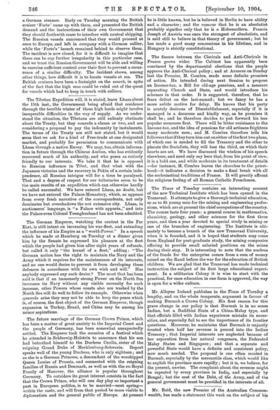The Tibetan Expedition will, it is stated, leave Lhasa about
the 15th inst., the Government being afraid that residence through the terrible winter of those high lands might involve insuperable difficulties in the way of supply. As we under- stand the situation, the Tibetans are still sullenly obstinate about the Treaty, but they concede a clause or two, and are considering a proposal to pay the indemnity by instalments. The terms of the Treaty are still not stated, but it would seem that we ask for a kind of Free-trade at one designated 'market, and probably for permission to communicate with Lhasa through a native Envoy. We may, too, obtain informa- tion in future through the Chinese Amban, who has evidently recovered much of his authority, and who poses as entirely friendly to our interests. We take it that he is opposed to Russian influence in Tibet, and that what with the Japanese victories and the recovery in Pekin of a certain inde- pendence, all Russian intrigue will for a time be paralysed. That and a degree of respect for our tributaries seem to be the main results of an expedition which can otherwise hardly be called successful. We have entered Lhasa, no doubt, but we have not entered the Palace-Monastery, which, as appears from every fresh narrative of the correspondents, not only dominates but overshadows the not extensive city. Lhasa, in auctioneers' language, is "a Palace with appurts.," and into the Palace even Colonel Younghusband has not been admitted.


































 Previous page
Previous page